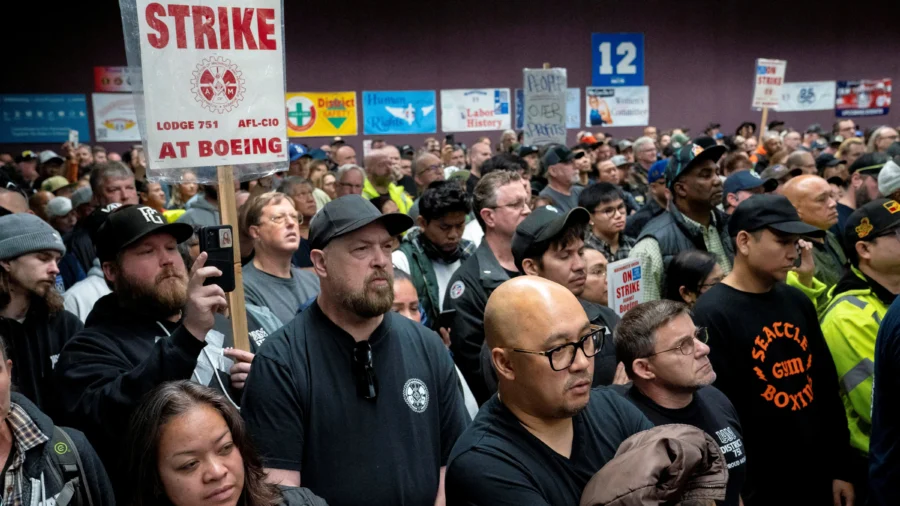Boeing factory workers have rejected the company’s recent contract proposal and will continue the strike that has lasted six weeks, devastating the aerospace manufacturing giant.
Sixty-four percent of frontline International Association of Machinists and Aerospace Workers (IAM) members voted against accepting Boeing’s latest contract offer.
“After 10 years of sacrifices, we still have ground to make up, and we’re hopeful to do so by resuming negotiations promptly,” said Jon Holden, president of IAM District 751, and Brandon Bryant, president of IAM District W24, in a joint statement.
“Workers across America know what it’s like for a company to take and take—and Boeing workers are saying they are fully and strongly committed to balancing that out by winning back more of what was taken from them by the company for more than a decade.”
The IAM leadership confirmed they will return to the bargaining table, negotiate in good faith, and provide new dates for further negotiations.
“The entire IAM Union, all 600,000 members across North America, stand with our District 751 and W24 membership,” said IAM international president Brian Bryant in a statement. “Their fight is our fight—and we support their decision to continue this strike for fairness and dignity for Boeing workers.”
Boeing and the union representing 33,000 striking members reached a tentative agreement on Oct. 20 that would raise pay by 35 percent over four years.
The deal also offered a $7,000 ratification bonus and a one-time $5,000 contribution to workers’ Boeing 401(k) accounts. It also reinstates the Aerospace Machinists Performance Plan (AMPP) incentive plan with a guaranteed minimum annual payout of 4 percent.
About 33,000 union machinists have been on strike since Sept. 14.
Boeing Reports $6 Billion Quarterly Loss
Hours before the union voted, the company reported a net loss of $6.17 billion in the third quarter, lifting total losses for the year to nearly $8 billion.
Boeing registered an operating cash flow loss of $1.34 billion. Revenues tumbled 1 percent from the same time a year ago to $17.8 billion.
Boeing CFO Brian West stated that the company anticipates burning more cash in the fourth quarter and negative free cash flow for the full year of 2025. Additionally, the aerospace business expects to review its financial forecasts and long-term outlook.
“We’re clearly at a crossroads,” said Kelly Ortberg, the president and CEO of Boeing, during the conference call. “The trust in our company has eroded or saddled with too much debt. We’ve had serious lapses in our performance across the company, which have disappointed many of our customers.”
Boeing has failed to generate an annual profit since 2018. Instead, the company has lost more than $25 billion since the beginning of 2019 amid a series of challenges, from two 737 Max jets crashing to an intense labor dispute.
Year-to-date, Boeing shares are down 38 percent to about $157.
Coming Layoffs
The company has employed various changes to bolster its balance sheet.
Ortberg sent notices on Oct. 18 confirming that Boeing will lay off about 10 percent of its workers in the coming months, totaling approximately 17,000 employees.
“It will take time to return Boeing to its former legacy, but with the right focus and culture, we can be an iconic company and aerospace leader once again,” Ortberg said on Oct. 23. “Going forward, we will be focused on fundamentally changing the culture, stabilizing the business, and improving program execution, while setting the foundation for the future of Boeing.”
Tony Bancroft, a portfolio manager at Gabelli Funds, is confident that the company will experience a turnaround.
“Boeing has a good plan in place, and in the long term, it’s going to do well,” Bancroft said in a note shared with The Epoch Times. “Boeing is a good long term value story and growth story.”
It could require more than cost-cutting to improve operations—and its reputation.
The Federal Aviation Administration intensified scrutiny of Boeing after a panel blew out of a Max during a January Alaska Airlines flight. Boeing has also faced additional federal investigations and whistleblower complaints.
Boeing received negative publicity when NASA concluded that a Boeing spacecraft was not safe enough to return two astronauts home from the International Space Station.
A satellite manufactured by Boeing recently exploded after experiencing “an anomaly” on Oct. 19.
The Intelsat 33e satellite was launched in 2016 and provides communications across Africa and Asia. The U.S. Space Force is monitoring the space debris from the incident.
From The Epoch Times

